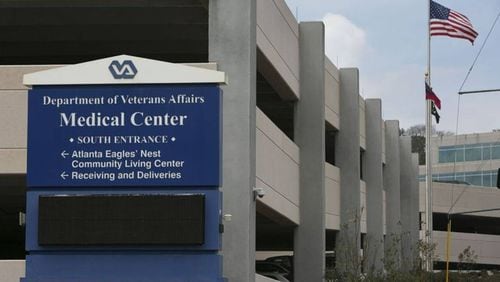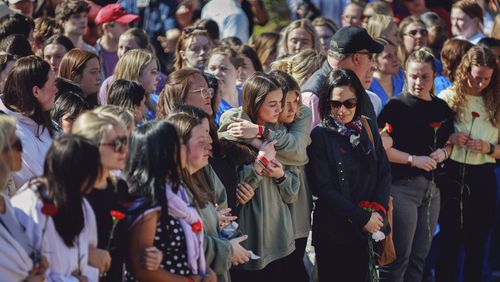The Atlanta VA intends to hire more employees to answer its phones and has reduced the number of mental health calls that are going unanswered, months after The Atlanta Journal-Constitution found evidence that veterans in crisis were struggling to reach the health care system.
“The Atlanta VA Health Care System is fully committed to providing exceptional care for our Veterans and recognizes the seriousness of recent concerns raised regarding unanswered mental health calls,” Chanel Cook, Communications Chief for the Atlanta VA Health Care System, said in a statement. “We acknowledge that there have been challenges and have taken action to address these challenges.”
In April, the AJC reported allegations that thousands of mental health calls to the Atlanta VA had gone unanswered over the past year, according to a whistleblower complaint. The complaint alleges that out of roughly 22,000 mental health calls that were made to the Atlanta VA Health Care System over a 12-month period, about 7,200 went unanswered.
The reason, according to the complaint, was that the VA’s Human Resources Department is slow in hiring applicants who can answer the phones. At the time the complaint was filed earlier this year, it reported the Atlanta VA had about a third of the staff needed to answer calls.
The AJC also interviewed a veteran who said she failed to get timely mental health care from the Atlanta VA. Back in 2021, she was in the midst of a mental health crisis and called the Atlanta VA about 10 times in the span of three months. Someone answered the phone only about half the time, she says. The veteran, who spoke on the condition of anonymity, says she eventually got help, but only after driving herself to the Atlanta VA emergency room.
The recent improvements came after the VA Southeast Network, which covers Georgia, Alabama, and South Carolina, partnered with another VA regional health care network to help handle the influx of calls received at the Atlanta VA. But the Atlanta VA is still far from having its own fully-staffed call center.
In April, the Atlanta VA had dozens of people working at its call center, and still has a similar number today. Cook said they are working to hire more than 100 people, and aim to ultimately have a total of 180 staff at its call center, which handles a range of concerns called in by veterans. She said the focus on improving the call center was the result of “ongoing improvement efforts” and wasn’t a direct result of the whistleblower complaint.
The number of unanswered mental health calls made to the Atlanta VA Health Care System has decreased since April, and significantly declined from June to July.
· In April 2023, the Atlanta VA received 1,875 mental health calls, of which 50% were unanswered.
· In May 2023, the Atlanta VA received 2,244 mental health calls, of which 44% were unanswered.
· In June 2023, the Atlanta VA received 2,428 mental health calls, of which 44% were unanswered.
· In July 2023, the Atlanta VA received 2,171 mental health calls, of which 3% were unanswered.
Beyond the phone lines, advocates for veterans have told the AJC that the basic systems in place to treat the mental health of thousands of veterans in Georgia are not working. There is a shortage of therapists in the VA who can treat veterans in the state, as well as frequent staff turnover, according to Jim Lindenmayer, director and founder of the Cherokee County Homeless Veterans Program. He’s also spoken with veterans who have made appointments and the therapists don’t show up.
What’s more, he’s found that veterans are more comfortable talking directly to veterans, instead of a therapist.
“What we’ve experienced out here is that veterans want to talk to veterans first. They’re afraid of getting put to a therapist who’s going to try to give them a shotgun answer of what’s wrong with them,” he said.
Cook said the VA will continue to monitor the call center until any barriers veterans encounter are addressed, and are working on implementing a “robust mental health triage system” to prioritize urgent calls.
“We understand that there is a Veteran at the end of every call that goes unanswered, and we must have the systems and staff in place so that every Veteran can access the care they have earned, however they try to contact us,” Cook said. “We will not rest until every call is answered, and every Veteran gets the support they need and deserve.”
Veterans who are in immediate crisis should dial 988, the national mental health hotline, then press 1. They can also chat online at VeteransCrisisLine.net/Chat, or text 838255.
OUR REPORTING: In April, the AJC reported exclusively on allegations that thousands of mental health calls to the Atlanta VA Health Care System had gone unanswered over the past year because the VA was slow in hiring applicants who could answer the phones, according to a complaint. The AJC asked VA officials for an update on the situation and learned that since April, the Atlanta VA has drastically reduced the number of unanswered mental health calls, but still has plans to hire more than 100 workers to answer the phones.






